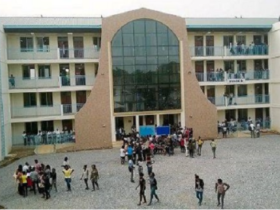List of Universities in Tanzania Offering BSc Radiography in Medical Imaging: Tanzania is a country in East Africa that offers a variety of degree programs in the field of radiography and medical imaging. Radiography is a medical specialty that uses imaging techniques to diagnose and treat diseases. Medical imaging, on the other hand, involves the use of technology to create visual representations of the human body for diagnostic and therapeutic purposes.
Several universities in Tanzania offer Bachelor of Science in Radiography programs. These programs typically include coursework in anatomy, physiology, medical physics, radiation protection, and imaging techniques. Students also receive hands-on training in the use of imaging equipment such as X-ray machines, CT scanners, and MRI machines. Graduates of these programs are prepared to work in a variety of healthcare settings, including hospitals, clinics, and private practices.
If you are interested in pursuing a career in radiography and medical imaging in Tanzania, it is important to research the universities that offer these programs. This article provides a list of universities in Tanzania that offer Bachelor of Science in Radiography programs. By choosing a reputable and accredited institution, you can ensure that you receive the education and training you need to succeed in this exciting and rewarding field.
Radiography and Medical Imaging in Tanzania
Radiography and Medical Imaging is a field that involves the use of various imaging technologies to diagnose and treat medical conditions. In Tanzania, there are several universities and colleges that offer Bachelor of Science (BSc) degrees in radiography and medical imaging. These programs are designed to equip students with the skills and knowledge necessary to work as radiographers in various healthcare settings.
Some of the universities that offer BSc in Radiography and Medical Imaging in Tanzania include the Catholic University of Health and Allied Sciences (CUHAS) in Mwanza, the Muhimbili University of Health and Allied Sciences (MUHAS) in Dar es Salaam, and the Open University of Tanzania (OUT) in Kinondoni DSM. These universities provide students with a comprehensive curriculum that covers various aspects of radiography and medical imaging, including anatomy, physiology, radiographic procedures, radiation protection, and image analysis.
The BSc in Radiography and Medical Imaging programs in Tanzania typically take four years to complete. Students are required to undertake both theoretical and practical coursework, which includes laboratory sessions, clinical placements, and research projects. Upon graduation, students are expected to have acquired the necessary skills and knowledge to work as radiographers in various healthcare settings, including hospitals, clinics, and research institutions.
In addition to the BSc programs, there are also diploma programs in Diagnostic Radiography offered in Tanzania. These programs are typically shorter in duration, ranging from two to three years. Some of the universities that offer diploma programs in Diagnostic Radiography include CUHAS in Mwanza and MUHAS in Dar es Salaam. These programs are designed to provide students with the necessary skills and knowledge to work as radiographers in various healthcare settings.
Overall, Radiography and Medical Imaging is an important field in Tanzania’s healthcare system. The universities and colleges that offer BSc and diploma programs in Radiography and Medical Imaging play a crucial role in preparing students to work as radiographers in various healthcare settings.

List of Universities Offering BSc Radiography
Tanzania has several universities that offer Bachelor of Science in Radiography and Medical Imaging. These universities provide students with knowledge and skills in medical imaging technology, radiation safety, and patient care. Below is a list of universities in Tanzania offering BSc Radiography:
- Muhimbili University of Health and Allied Sciences (MUHAS) – MUHAS is one of the leading institutions in Tanzania that offer BSc Radiography. The program is designed to provide students with knowledge and skills in medical imaging technology, radiation safety, and patient care. The duration of the course is four years.
- Kilimanjaro Christian Medical University College (KCMUCO) – KCMUCO is another institution that offers BSc Radiography. The program is designed to prepare students for careers in medical imaging technology, radiation safety, and patient care. The duration of the course is four years.
- St. Francis University College of Health and Allied Sciences (SFUCHAS) – SFUCHAS is another institution that offers BSc Radiography. The program is designed to provide students with knowledge and skills in medical imaging technology, radiation safety, and patient care. The duration of the course is four years.
- Tumaini University Makumira (TUMA) – TUMA is another institution that offers BSc Radiography. The program is designed to prepare students for careers in medical imaging technology, radiation safety, and patient care. The duration of the course is four years.
- Hubert Kairuki Memorial University (HKMU) – HKMU is another institution that offers BSc Radiography. The program is designed to provide students with knowledge and skills in medical imaging technology, radiation safety, and patient care. The duration of the course is four years.
- Open University of Tanzania (OUT) – OUT is another institution that offers BSc Radiography. The program is designed to prepare students for careers in medical imaging technology, radiation safety, and patient care. The duration of the course is four years.
In conclusion, Tanzania has several universities that offer BSc Radiography. These institutions provide students with knowledge and skills in medical imaging technology, radiation safety, and patient care. Students who complete the program can pursue careers in various fields such as radiography, medical imaging, and radiation therapy.
University of Dar es Salaam
The University of Dar es Salaam (UDSM) is a public university located in Dar es Salaam, Tanzania. It was established in 1961 and is the oldest and largest university in Tanzania. The university offers various undergraduate and postgraduate programs in different fields of study, including radiography and medical imaging.
Course Overview
The Bachelor of Science in Radiography and Medical Imaging program at UDSM is a four-year course that aims to provide students with the necessary knowledge, skills, and attitudes to become competent radiographers. The program covers various topics, including anatomy and physiology, radiation physics, radiographic techniques, medical imaging, and patient care.
The program also includes clinical placements where students can apply their theoretical knowledge in real-life situations. During these placements, students work under the supervision of qualified radiographers and gain hands-on experience in different radiography and medical imaging procedures.
Admission Requirements
To be eligible for the Bachelor of Science in Radiography and Medical Imaging program at UDSM, applicants must meet the following admission requirements:
- Have a minimum of two principal passes in science subjects in the Advanced Certificate of Secondary Education Examination (ACSEE) or equivalent.
- Have a minimum of a credit pass in Biology, Chemistry, Physics, and Mathematics in the Certificate of Secondary Education Examination (CSEE) or equivalent.
- Pass a medical examination conducted by a qualified medical practitioner.
- Meet any other requirements set by the University of Dar es Salaam or the Tanzania Commission for Universities.
In conclusion, the University of Dar es Salaam is one of the universities in Tanzania that offers a Bachelor of Science in Radiography and Medical Imaging program. The program provides students with the necessary knowledge and skills to become competent radiographers. To be eligible for the program, applicants must meet the admission requirements set by the university.
Nelson Mandela African Institute of Science and Technology
The Nelson Mandela African Institute of Science and Technology (NM-AIST) is a public institution located in Arusha, Tanzania. It is part of the network of Pan-African Institutes of Science and Technology spread across the continent. The university offers various undergraduate and graduate programs in science and technology, including BSc Radiography.
Course Overview
The BSc Radiography program at NM-AIST is a four-year full-time course that aims to provide students with the skills and knowledge required to become competent radiographers. The program covers a wide range of topics, including anatomy, physiology, medical physics, radiation protection, and image interpretation. Students also receive practical training in radiography techniques and equipment operation.
Upon completion of the program, graduates can pursue careers in various healthcare settings, including hospitals, clinics, and diagnostic imaging centers. They can also opt to further their education by pursuing a master’s degree in radiography or related fields.
Admission Requirements
To be eligible for admission to the BSc Radiography program at NM-AIST, applicants must meet the following requirements:
- Have a minimum of two principal passes in science subjects at the Advanced Certificate of Secondary Education Examination (ACSEE) level or equivalent.
- Have a minimum GPA of 2.5 in science subjects at the Ordinary Certificate of Secondary Education Examination (OCSEE) level or equivalent.
- Pass the NM-AIST entrance examination and an interview.
Applicants who meet the above requirements are considered for admission based on merit. The university also encourages applications from students from diverse backgrounds and nationalities.
In conclusion, NM-AIST is one of the universities in Tanzania that offers a BSc Radiography program. The program aims to equip students with the skills and knowledge required to become competent radiographers and pursue careers in various healthcare settings. To be eligible for admission, applicants must meet the university’s admission requirements, including having a minimum of two principal passes in science subjects at the ACSEE level or equivalent and passing the NM-AIST entrance examination and an interview.
Ruaha Catholic University
Course Overview
Ruaha Catholic University (RUCU) is one of the universities in Tanzania that offers a Bachelor of Science in Radiography and Medical Imaging. This program is designed to provide students with the knowledge and skills necessary to become professional radiographers. The program is offered by the Department of Radiography and Medical Imaging within the Faculty of Medicine and Allied Health Sciences.
The BSc Radiography program at RUCU covers a wide range of topics, including anatomy and physiology, medical physics, radiation protection, imaging techniques, and patient care. Students will also have the opportunity to gain practical experience through clinical placements in hospitals and other healthcare facilities.
Admission Requirements
To be eligible for admission into the BSc Radiography program at RUCU, prospective students must meet the following requirements:
- Have a minimum of two principal passes in science subjects (Biology, Chemistry, Physics, or Mathematics) at A-Level
- Have a minimum of four passes in relevant subjects at O-Level
- Meet the university’s minimum entry requirements
In addition to these requirements, prospective students may also be required to pass an entrance exam and/or participate in an interview process.
Overall, the BSc Radiography program at RUCU provides students with a solid foundation in radiography and medical imaging, preparing them for a rewarding career in the healthcare industry.
Kilimanjaro Christian Medical University College
Course Overview
Kilimanjaro Christian Medical University College (KCMUCo) is a constituent college of Tumaini University Makumira located in Moshi, Tanzania. The college offers a Bachelor of Science in Radiography and Medical Imaging, which is a four-year program designed to train students in the use of medical imaging techniques to diagnose and treat diseases. The program is accredited by the Tanzania Commission for Universities (TCU) and the Health Professionals Council of Tanzania (HPCT).
The BSc Radiography program at KCMUCo covers a range of topics, including anatomy, physiology, pathology, medical imaging physics, radiation protection, and patient care. Students are also trained in the use of various medical imaging technologies, such as X-ray, CT, MRI, and ultrasound. The program includes both theoretical coursework and practical training in clinical settings.
Admission Requirements
To be eligible for admission to the BSc Radiography program at KCMUCo, students must meet the following requirements:
- Hold a Certificate of Secondary Education Examination (CSEE) with at least four passes in non-religious subjects, including a pass in chemistry and biology.
- Hold a Diploma in Radiography or related field from a recognized institution, with a minimum GPA of 3.0.
- Pass an entrance examination and oral interview conducted by KCMUCo.
In addition to these requirements, applicants must also meet the general admission requirements set by TCU, which include a minimum GPA of 2.0 for CSEE and a minimum of two principal passes in relevant subjects for Advanced Certificate of Secondary Education Examination (ACSEE) or equivalent.
Overall, KCMUCo is a reputable institution that provides quality training in Radiography and Medical Imaging. The program is designed to equip students with the necessary skills and knowledge to become competent and ethical radiographers who can contribute to the healthcare system in Tanzania and beyond.
Hubert Kairuki Memorial University
Course Overview
Hubert Kairuki Memorial University (HKMU) is a private medical university in Dar es Salaam, Tanzania that offers a Bachelor of Science in Radiography and Medical Imaging. The program is designed to provide students with the knowledge and skills required to become competent radiographers and medical imaging professionals. The course is five years long and is divided into ten semesters.
The BSc Radiography program at HKMU covers a wide range of topics, including anatomy, physiology, radiation physics, radiographic procedures, medical imaging techniques, and patient care. The program also includes clinical placements where students can gain hands-on experience in a variety of healthcare settings, including hospitals, clinics, and diagnostic imaging centers.
Admission Requirements
To be admitted to the BSc Radiography program at HKMU, applicants must meet the following requirements:
- Have a minimum of two principal passes in science subjects (Biology, Chemistry, and Physics) in their A-level examinations or its equivalent.
- Have a minimum GPA of 2.0 in their high school diploma or its equivalent.
- Pass an entrance examination and an interview conducted by the university.
In addition to the above requirements, applicants must also provide certified copies of their academic transcripts, birth certificate, and passport photos.
Overall, the BSc Radiography program at HKMU is an excellent choice for those who want to pursue a career in medical imaging. The program provides students with a solid foundation in radiography and medical imaging techniques, and prepares them for a rewarding career in healthcare.
Comparison of Universities
When it comes to pursuing a Bachelor of Science in Radiography in Tanzania, there are several universities to choose from. Here is a comparison of some of the universities in Tanzania offering this program:
Open University of Tanzania
The Open University of Tanzania (OUT) offers a Bachelor of Science in Radiography with a specialization in Medical Imaging Technology. The program takes four years to complete and covers a range of topics such as radiation physics, radiographic anatomy, and imaging techniques. The program also includes clinical placements to give students practical experience.
Catholic University of Health and Allied Sciences
The Catholic University of Health and Allied Sciences (CUHAS) offers a Bachelor of Science in Radiography with a specialization in Diagnostic Radiography. The program takes four years to complete and includes both theoretical and practical components. Students will learn about radiation protection, radiographic positioning, and image interpretation.
Kilimanjaro Christian Medical University College
Kilimanjaro Christian Medical University College (KCMUCo) offers a Bachelor of Science in Radiography with a specialization in Diagnostic Radiography. The program takes four years to complete and includes both theoretical and practical components. Students will learn about radiographic anatomy, imaging techniques, and radiation protection. The program also includes clinical placements to give students practical experience.
Muhimbili University of Health and Allied Sciences
Muhimbili University of Health and Allied Sciences (MUHAS) offers a Bachelor of Science in Radiography with a specialization in Diagnostic Radiography. The program takes four years to complete and includes both theoretical and practical components. Students will learn about radiation physics, radiographic anatomy, and imaging techniques. The program also includes clinical placements to give students practical experience.
Overall, these universities offer similar programs with a focus on both theoretical and practical components. Students will learn about radiation physics, radiographic anatomy, and imaging techniques. The programs also include clinical placements to give students practical experience. Students should consider factors such as location, tuition fees, and reputation when choosing a university to pursue their Bachelor of Science in Radiography.
Career Prospects in Radiography and Medical Imaging
Graduates of Radiography and Medical Imaging programs have a wide range of career opportunities in various healthcare settings. Here are some of the career prospects for BSc Radiography graduates in Tanzania:
Radiologic Technologist
Radiologic technologists are responsible for performing diagnostic imaging examinations, such as X-rays, CT scans, MRI scans, and mammograms. They work closely with radiologists and other healthcare professionals to ensure accurate and safe imaging procedures. Radiologic technologists can work in hospitals, clinics, imaging centers, and other healthcare facilities.
Sonographer
Sonographers use specialized equipment to produce images of the body’s internal organs and tissues. They work closely with physicians to diagnose and treat various medical conditions. Sonographers can specialize in different areas, such as obstetrics and gynecology, cardiology, and neurology.
Nuclear Medicine Technologist
Nuclear medicine technologists use radioactive materials to create images of the body’s organs and tissues. They work closely with physicians to diagnose and treat various medical conditions, such as cancer, heart disease, and neurological disorders. Nuclear medicine technologists can work in hospitals, clinics, and imaging centers.
MRI Technologist
MRI technologists use magnetic resonance imaging (MRI) scanners to produce images of the body’s internal organs and tissues. They work closely with radiologists and other healthcare professionals to ensure accurate and safe imaging procedures. MRI technologists can work in hospitals, clinics, and imaging centers.
Radiation Therapist
Radiation therapists use radiation to treat cancer and other medical conditions. They work closely with oncologists and other healthcare professionals to develop and administer radiation treatment plans. Radiation therapists can work in hospitals, clinics, and cancer treatment centers.
In conclusion, graduates of Radiography and Medical Imaging programs have a wide range of career opportunities in various healthcare settings. The demand for these professionals is expected to grow in the coming years, making it a promising career path for those interested in healthcare and technology.
Final Thoughts
pursuing a degree in Radiography and Medical Imaging from a reputable university in Tanzania can lead to a fulfilling career in the healthcare industry. The field is constantly evolving with new technologies and techniques being developed to improve patient care.
It is important to carefully research and compare the different universities offering the program to find the best fit for individual needs and goals. Factors such as location, tuition fees, program duration, and available resources should be taken into consideration when making a decision.
Additionally, students should take advantage of opportunities such as internships and practical training to gain hands-on experience and develop their skills. Building a strong professional network and staying up-to-date with industry developments can also be beneficial in advancing one’s career.
Overall, a degree in Radiography and Medical Imaging can open up a range of career options and provide a rewarding and fulfilling career helping others.
FAQs
What universities in Tanzania offer BSc Radiography programs?
Several universities in Tanzania offer BSc Radiography programs. Some of the universities offering this program include the Open University of Tanzania, Catholic University of Health and Allied Sciences, and Muhimbili University of Health and Allied Sciences.
What are the admission requirements for BSc Radiography programs in Tanzania?
The admission requirements for BSc Radiography programs in Tanzania vary depending on the university. However, most universities require candidates to have completed their secondary education and have obtained a minimum of three principal passes in Physics, Chemistry, and Biology. Additionally, some universities may require candidates to have work experience in a related field.
How long does it take to complete a BSc Radiography program in Tanzania?
The duration of a BSc Radiography program in Tanzania is typically four years. However, this may vary depending on the university and the program’s structure.
What is the curriculum like for BSc Radiography programs in Tanzania?
The curriculum for BSc Radiography programs in Tanzania typically covers topics such as medical imaging technology, radiographic procedures, anatomy and physiology, radiation physics, and patient care. Students also receive practical training in radiography techniques and procedures.
Are there any specialized areas of focus within BSc Radiography programs in Tanzania?
Yes, some universities may offer specialized areas of focus within BSc Radiography programs, such as computed tomography (CT), magnetic resonance imaging (MRI), and mammography.
What career opportunities are available for graduates of BSc Radiography programs in Tanzania?
Graduates of BSc Radiography programs in Tanzania can pursue careers in a variety of settings, including hospitals, clinics, research centers, and private practices. Some of the job titles that graduates can hold include radiologic technologist, MRI technologist, CT technologist, and mammography technologist. Additionally, graduates can pursue further education and training to specialize in a particular area of radiography.
Also Ready;-
- List of Universities in Tanzania Offering Bachelor of Dental Surgery Degree Program
- List of Universities in Tanzania Offering Bachelor of Medicine and Bachelor of Surgery Degree
- List of Pharmacy Courses Offered by Colleges and Universities in Mbeya Region 2023/2024
- Top Universities for Engineering in Tanzania 2023/2024: Rankings and Insights
- Top Universities for Clinical Medicine Courses in Tanzania 2023/2024: Full Guide






Leave a Reply